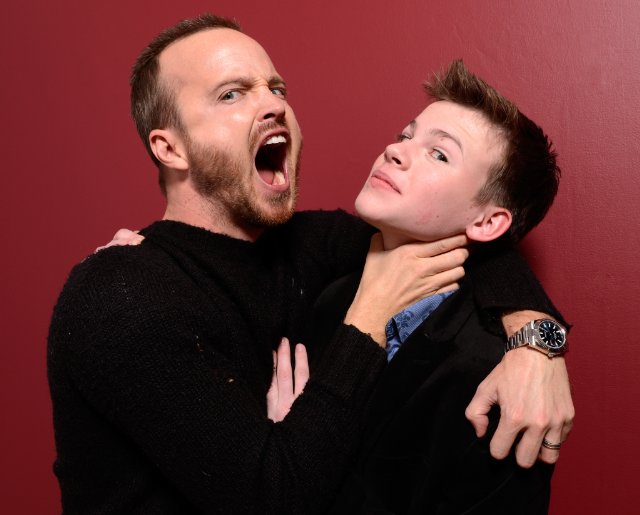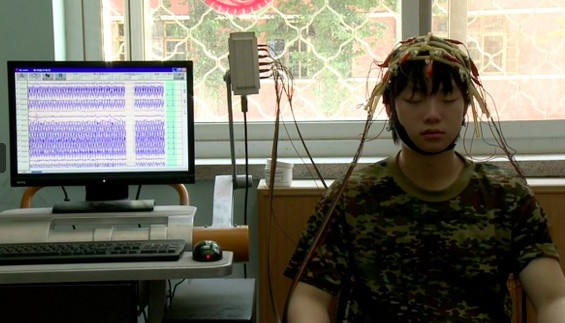Our Sundance 2014 coverage is entering the home stretch - Nathaniel
 Aaron Paul and Josh Wiggins ham it up at Sundance
Aaron Paul and Josh Wiggins ham it up at Sundance
The 30th Annual Sundance Film Festival closes tonight -- they're screening all of last night's prize winners one last time today in their prescheduled TBA WINNER slots for each of the categories (World Dramatic, US Doc, etcetera) -- but we've got a bit of a backlog so I hope you can stick it out through two more days of wrap up reviews whilst we travel home. Well, actually, I'm the only one still left in Utah but I return to NYC in the morning. I've had a great time but I can't wait to resume normal living with my own bed, my cat, my laundry, my kitchen, etcetera. I'll sure miss that ski-lift though.
So herewith quick thoughts on three films about teenage boys who've lost their parents, either literally or emotionally, and are in very deep trouble. Web Junkie, White Shadow, and the most high profile of them Hellion starring Aaron Paul and breakout teen star Josh Wiggins pictured above...

WEB JUNKIE
Since I prefer narrative features to documentaries I rarely schedule them at festivals and instead wait it out and let awards season / critics curate the best ones for me. But this fit super neatly into my schedule at a scant 79 minutes and I found the subject fascinating. Web Junkie trains its cameras on an internet addiction rehabilitation camp in China (yes, they exist. And hundreds of them, too) and three teenage boys who are locked up within (Hope, Hacker, and Nickey... it's possible I'm misremembering their names). China is one of the first countries to declare internet addiction a clinical disorder. Some of the tales you hear in the movie sound like urban myths (teenagers going days without food or sleep and wearing diapers so that they don't have to take breaks from their virtual games) but as you hear the kids speak these myths become reality, albeit the embellished kind; When the kids are alone in their cells they brag about their longest sessions, how little sleep they need, and the benders they were on when their parents had finally had enough.
This documentary mostly eschews traditional talking head footage and trains its cameras on group lectures, therapy sessions, and observational footage of the camp. Watching the family therapy sessions in particular is illuminating about only child loneliness, generational gaps, connection problems, and yes addiction. But despite the compelling subject and strong individual scenes, I found the documentary maddeningly insufficient and painfully short on follow through. A few examples: One teenager asks his therapist rather meekly if he can put his hand through the window (!!!) and she says very calmly "let's go to the venting room"... but we don't go with them. What is the venting room and how is this different from a therapy conversation?; We're told that it's a rehabilitation camp but apart from therapy sessions and a little exercize and one brief classroom interlude, we don't really know what the treatments are like - how do they fill 16 hour days?; The teenagers compain of brainwashing, but we don't see anything that looks like that, with the possibility of one boring lecture from Professor Tao, an expert on internet addiction; We're told by the therapists that isolation is bad for teenagers and yet one the therapy treatments is 10 days isolation with no human contact? No explanation is given.
Grade: C+
Distribution: The UK will get it. Not the US as of yet.
 WHITE SHADOW
WHITE SHADOW
This harrowing Tanzanian movie from German director Noaz Deshe is about a young orphaned albino named Alias buy whose life is continually in danger. He sees his father brutally dismembered for a buck since witch doctors will pay high price for internal organs and limbs of albinos which they consider potent for spells and potions. His mother sends him away from their village to live with his troubled widower uncle who immediately puts him to work hawking junk in the city. Alias's living nightmare is appropriately visualized with unsettlingly hallucinatory cinematography (the title is illustrated with great panache in the film's most terrifying nighttime sequences, and images backlit by a blazing sun also feel surreal) and hyperreal daytime views of poverty and desolate open spaces and junkyards.
Some of the imagery takes on a weird bubbling effect, as if the camera is in and out of focus during minor zoom ins. I don't quite know how to describe it which could also be said of the movie which is foreign enough to these eyes to be hard to follow at times - some of the superstitions and religious beliefs (splintered and contradictory) were confounding and I was initially very confused by a long funeral sequence in which Muslims and Christians seem to be at war only to have the matter settled with money and characters who could care less about religion like Alias and his would be girlfriend (who is also his cousin). White Shadow struck me as a horror film, though it's screenplay seems more inclined toward drama and makes great use of both biting dialogue and narrative structure to draw constant attention to the buying and selling of everything (including, of course, albino parts). Alias is even asked to repeat the word "commerce" over and over by his nomadic uncle who is in an dangerous amount of debt. It was a difficult sit but a rewarding one.
Grade: B
Distribution: Unlikely. African films are rarely seen in the States apart from festival showings or on the off chance that they wind up in the Best Foreign Language Film race at the Oscars. To my knowledge Tanzania has only ever submitted one film for Oscar consideration (Maangamizi: The Ancient One, 2001)
 Josh Wiggins is a hellionHELLION
Josh Wiggins is a hellionHELLION
Hellion was one of two hot Sundance titles this year about the difficult relationship between a father and his son that sprung from an earlier acclaimed short by the same filmmaker. (Whiplash, which I wasn't able to see, was the other and picked up Supporting Actor Oscar buzz for J.K. Simmons as a militaristic father). Expanding your acclaimed short is a common path to fame (if not, generally, fortune) for indie filmmakers. Short Term 12 demonstrated just last year how rich the rewards can be when a young filmmaker gets more money, more time, and usually at least one famous face, to help flesh out material that they're truly connected to.
Kat Chandler's Texas-set family drama is about a widower Hollis Wilson (Aaron Paul, excellent but that shouldn't surprise you) trying to raise his two boys after his wife's untimely death. His sister-in law (Juliette Lewis), who he occasionally leans on but resents, watches from the sidelines warily, knowing that he's doing a shit job of it. Hollis is unable to give the kids what they need emotionally due to his own grief. His oldest son Jacob (Josh Wiggins) is the title character, always in trouble and a true terror in his neighborhood, setting fires, destroying cars, drinking and smoking, and most troublingly leading the kid brother (Deke Gardner) he so clearly loves and wants to protect down the same path. Despite the obnoxiously loud heavy metal song score and sound mixing (authentic I'm sure to what the young Motorcross obsessed delinquents might favor) much of the film is dramatically subtle and moving -- I especially loved the tiptoe way the characters and filmmaker deal with the subject of the mother's death, explained only through visuals, and rarely explicitly addressed by the men so thoroughly damaged by her absence. It's all beautifully acted by its only famous faces (Paul & Lewis) but also by its unknown young players: Josh Wiggins and Deke Garner are both naturals and/or Kat Chandler has a gift with child actors.
The film's last act veers too far into melodrama and an inauthentic upping of the ante in terms of the juvenile violence. This undercuts the mostly subtle work of the actors but for much of its running time this is an absorbing and moving family-in-crisis drama.
Grade: B
Distribution: It's possible I missed a news story on this one and couldn't find information as I wrapped up this article but if it hasn't been picked up yet, I can't imagine that it won't be.